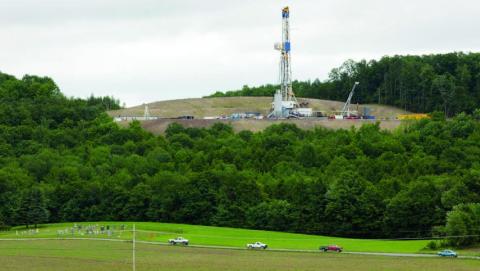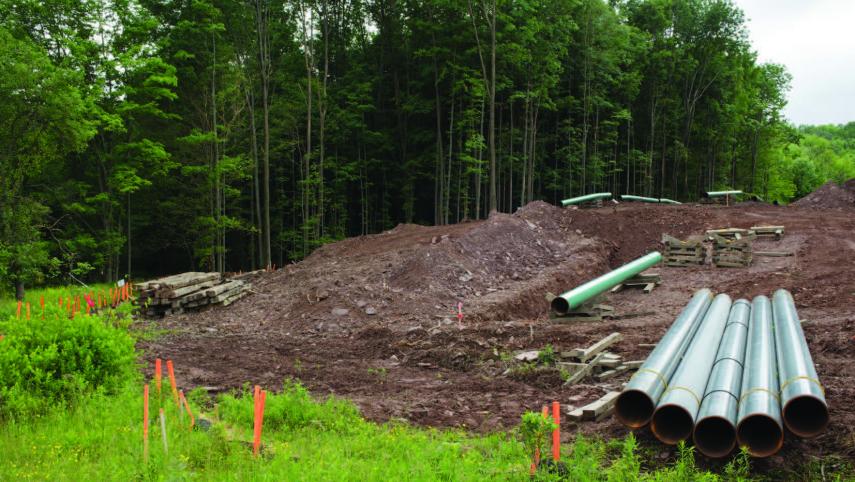The Fracking Debate

This spring, 18 Lehigh University professors from six departments spanning three colleges took a field trip to the center of shale gas mining in Pennsylvania, one of America’s shale gas hotspots. First they visited a well pad in Bradford County, which leads the state in issuing permits for extracting shale gas with blasts of chemicals, sand and water—a process called hydraulic fracturing, or fracking.
Then they visited a plant for recycling fracked water in nearby Lycoming County, a new boom-town for shale gas subsidiaries.
One sight surprised Alec Bodzin, an associate professor in the College of Education’s teaching, learning and technology program and a faculty member in Lehigh’s Environmental Initiative. He just couldn’t believe the chronic rush-hour traffic of trucks carrying water to and from the fracking sites. Without pipelines or pumping stations, heavy-duty vehicles have to haul three million gallons of water per well, a massive procedure and procession that severely stresses rural roads and municipal road crews.
For Bodzin, the phenomenon solidified his belief that trucking is a key to understanding, and teaching, the fractured debate over fracking. His environmental studies students learn that while trucks damage roads and pollute the air, they also provide jobs and stimulate depressed local economies. Future science teachers, he insists, need to provide a fair, objective assessment of a highly complex, highly charged issue to middle and high schoolers, particularly those with parents directly affected by fracking.
“The shale gas train is rolling and won’t stop,” says Bodzin. “As a society we need to do our homework and make informed decisions. We shouldn’t just jump on the bandwagon for the economy or the environment.”
Understanding the Controversy
The field trip capped Lehigh’s 2011-2012 exploration of the vast, increasingly valuable rock formation known as the Marcellus Shale. A black shale formation rich with natural gas, Marcellus Shale runs from Ohio and West Virginia northeast into Pennsylvania and southern New York. The fracking process used to extract the gas was discussed in panel discussions throughout the year, one of which was moderated by Bodzin, and in courses ranging from Bodzin’s Environmental Education to environmental engineering’s Risk Assessment.
Lehigh presented its Marcellus Shale initiative during a political tsunami. In February, Pennsylvania Governor Tom Corbett signed Act 13, which permits most oil and gas operations in all the state’s zoning districts, including ones with schools, parks and hospitals. In April, President Barack Obama authorized the creation of a high-level federal agency to coordinate shale gas production, a rapidly growing industry likened to a 21st-century gold rush. Indeed, over the next two decades more than 50,000 fracking wells are expected to open in Pennsylvania alone.
The complexities of fracking were presented during an April panel discussion, which took place five days after Obama’s executive order. The busiest panelist was Ray Stolinas, director of the planning commission in Bradford County, Pennsylvania’s ground zero for fracking. His county, he pointed out, has granted more than 2,000 permits to extract shale gas, the largest number in the state. The fracking industry has boosted the fortunes of restaurateurs, hoteliers and landlords; however, it’s been a misfortune for low-income families forced to leave their apartments after their rents tripled.
Stolinas and his five fellow panelists agreed on the need for better monitoring of shale gas health issues. Near the top of their wish list is a systematic study of the effect of fracking on drinking water.
They also requested more tests of public water before and after the opening of fracking wells, procedures that many property owners decline because they’re expensive and confusing.
“The shale gas train is rolling and won’t stop. As a society we need to do our homework and make informed decisions. We shouldn’t just jump on the bandwagon for the economy or the environment.”
Dr. Alec Bodzin, Professor of Teaching, Learning & Technology
Fracking in the Classroom
The panel clarified issues for Luke Markiewicz, a student in Bodzin’s Environmental Education class and a native of Pennsylvania’s Washington County, another fracking center. The master’s candidate in education then synthesized this information into a final paper on fracking. He compared advantages (lower heating costs, a cheaper energy alternative to foreign oil) to disadvantages (more greenhouse gases, more contaminated wastewater), and recommended replacing backflow ponds for wastewater with steel tanks. Markiewicz then used testimonials to personalize how fracking fractures communities: A woman traced her son’s stomach pains to well water spiked by fracking chemicals. A man discussed the $3,000 an acre he received for leasing his land with the excitement of a kid on Christmas morning.
Even after attending the panel and completing the paper, Markiewicz remains puzzled by fracking. He struggles to comprehend why the Environmental Protection Agency (EPA) can’t identify many of the exotic compounds in the nearly 600 fracking chemicals, or the health problems linked to the chemicals. He finds it easier to understand other ecological challenges, like planting wild grasses to restore Pennsylvania hills stripped by zinc mining.
The challenges are greater for students in Bodzin’s course in Science in Middle Level and High School Education. Imagine the difficulty of making an eighth grader grasp the economic and social dynamics of leasing land to shale gas drillers. On one hand, leasers may fund their children’s college tuition. On the other hand, their children may be ridiculed in school by the children of anti-fracking neighbors.
Maybe these neighbors don’t want to live a few hundred yards from an open waste pit. Or they may be jealous because they don’t own the mineral rights necessary for collecting rent and royalties.
“Students have to understand that environmental issues revolve around people’s livelihoods and lives,” says Bodzin. “Teachers have to present the facts from the perspectives of the many stakeholders involved, in unbiased, nonthreatening ways.”
Mining the Marcellus Shale is a mere dot on the environmental studies map at Broughal Middle School, Lehigh’s geographic neighbor and a curricular partner. The subject is just too complex and too controversial for eighth-graders, says science teacher Lori Cirucci, who has relatives who won’t lease their property for fracking because gas producers have refused to remove potentially hazardous waste. It’s simpler for her students to manage energy resources on the imaginary island of Navitas (Latin for energy), an instructional unit created by Bodzin and Lehigh colleagues.

Lehigh contemplates the political, social, economic and technological challenges of fracking—and how best to teach it.
Two Sides of Every Argument
Fracking is an exceptional exercise for Breena Holland, associate professor of political science and an expert on everything from air pollution to urban farming. Her Environmental Policy students had to write point-counterpoint papers where they defended fracking supporters, represented by the likes of the Marcellus Gas Coalition, and fracking opponents, represented by the likes of the Delaware Riverkeeper Network. “Students need to know both sides of the argument,” says Holland, “no matter what.”
However, as a social activist, Holland acknowledges that bias. She has no problem telling her students that she believes fracking advocates often deny the fact that the process is hazardous and may violate federal environmental laws. One of her sources is Andrew Stewart, a lawyer with the EPA’s Civil Enforcement division. During the April panel discussion, he revealed that heavy trucks and tankers have severely polluted a shale gas center in Wyoming, prompting the EPA to declare the former cattle farming hotspot an ozone danger zone.
Holland doesn’t need to visit Wyoming, or even the upper reaches of northeastern Pennsylvania, to interview citizens directly affected by fracking. She can find them in her classroom. Kimberly Williams, who took Holland’s Environmental Policy course this spring, opposes her parents’ desire to join their Virginia neighbors in leasing land for shale gas mining. A sophomore majoring in political science and environmental policy at Lehigh, she insists that fracking is an ecological and economic disaster. “There is a high likelihood that I will receive no financial gain,” she says, “only a heavy burden to deal with the damage.”
Williams prefers cleaner, greener sources of renewable energy, including solar power and wind power. She’ll learn more about the forces behind these alternatives during an internship with the EPA’s Office of Public Engagement, a forum for public and private stakeholders.
The April field trip attended by the 18 Lehigh professors was a forum, too. The mission was to increase awareness and decrease prejudice, says Frank Pazzaglia, chair of the department of earth and environmental sciences (EES) who organized the expedition with colleagues in four Lehigh departments and with leaders of the Penn State Marcellus Center for Outreach and Research. He indicates that teachers met workers at the Bradford County well pad who could become resources for academic projects. At the water recycling plant in Lycoming County, they discovered that some shale gas producers are trying to protect the environment, albeit with some pressure from the Pennsylvania Department of Environmental Protection.
“We wanted to open people’s eyes to the scope and scale of fracking to the number of people involved, the pace, the footprint,” says Pazzaglia, who also codirects the Environmental Initiative.
Pazzaglia admits that Lehigh’s Marcellus Shale footprint is intentionally light. “We decided not to dive right into the deep end of the pool, that it was better to start off by walking into the baby end,” he says. “We practiced due diligence. Now people will take it from here and vote with their feet.”
Pazzaglia, for example, plans to introduce the debate over water-hauling trucks into next spring’s EES Survey class. He’ll tell students that the rush-hour traffic “was incomprehensible, mind-boggling, crazy. It was impressive and depressing.”
Derick Brown, associate professor of environmental engineering and a water-quality authority, envisions his students preparing a capstone design project revolving around fracked water or the impact of fracking on public water. It could dovetail with previous capstone projects involving the expansion of the City of Bethlehem’s wastewater treatment plant and converting wastewater from a candy factory into electricity.
Brown also plans to continue teaching the politics of fracking in his Risk Assessment course. Future policy planners, he points out, need to know how to navigate the choppy gulf between too much rhetoric and too little scientific data. “I tell my students that you better know your stuff if you talk to a Marcellus group,” says Brown, a co-director of the Environmental Initiative. “You have to go in with the right approach. If it’s all emotional and you go in technical, they’ll run you out of the room.”
Holland has many options. The political scientist could examine how fracking impacts the rights of state bureaus, federal agencies and homeowners. She could also develop studies aimed at persuading legislators to replace fracking with ecologically friendlier activities, like farming and hiking.
Human Nature
David Casagrande, an associate professor of sociology and anthropology who studies how communities recover from natural disasters, is recruiting a fracking task force at Lehigh. The ecological anthropologist knows it will be difficult to herd scientists and social scientists into collaborating. He believes the wide divide could be narrowed by using geospatial devices to create an interdisciplinary database, a map of everything from income stratification to volunteer firefighting, quality of water to quality of life.
For Casagrande, shale gas mining is an ideal vehicle for exploring the confluence of nature and human nature.
“Fracking is not just a hot-button environmental issue, it’s an extremely divisive force,” he says. “It pits engineer against engineer, neighbor against neighbor, parent against child. It’s more difficult to understand, and to teach, because it’s more emotional.”